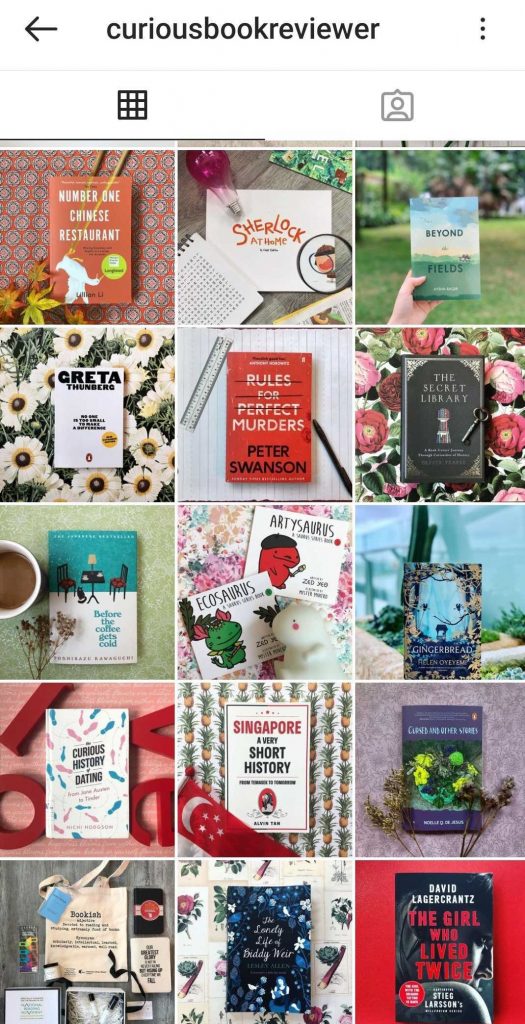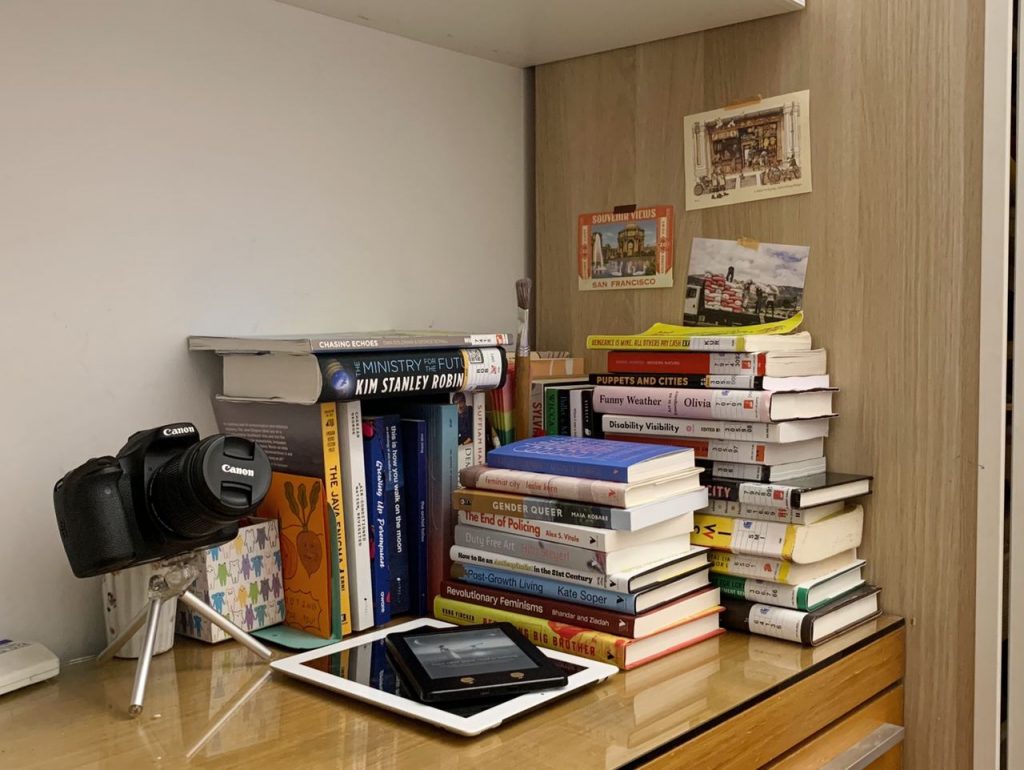Take for example the reactions on Facebook when Phase 3 was recently announced in Singapore. In true Singaporean fashion, people were divided into two camps, expressing either relief or disgruntlement at the timing of Phase 3. “Move on then become like Korea lorh”, one comment even read.
Unsurprisingly, this triggered snarky responses about Singaporeans’ unique ability to complain about every single thing.
This is merely a microcosm of the larger online sphere. Online conversations have become increasingly provocative, with individual comments sparking entire discussion threads, often with people going so far as to attack others personally for their opinions.
In the midst of all this chaos, one community has succeeded in creating a space on Instagram where individuals do not lunge for each other’s throats over every small disagreement.
Welcome to Bookstagram. It consists of people who use Instagram to share their lives through book recommendations or their perspective on books they’ve read. And of course, it helps if the pictures you take have #aesthetic appeal.

How have Bookstagrammers managed to remain civil and grounded, connecting with each other even if they do not always see eye to eye? How do they listen to each other in an online space that breeds more talkers than listeners? And as we reflect on a year of uncomfortable conversations, what can Bookstagrammers teach us about approaching these topics on the internet?
Earlier this year, a Straits Times journalist was harassed by Kpop fans online because her article was deemed as negatively portraying a celebrity. Bookstagram remains a community that is mostly devoid of such clashes or ‘cancel culture’—publicly shaming/demonetising someone whose opinion is perceived as offensive or causing hurt.
When the Black Lives Matter movement captured global attention, sparking heated debates, local Bookstagrammers started to show support for Black authors and businesses by sharing the works of Black people. Some pledged to make a conscious effort to read more diversely (read: being racially diverse specifically in the American context).
This raised some eyebrows within the local community. Some were critical of the inherent bias towards Western or American events. Others were worried that social media was fuelling the mindset that the West is the centre of the universe.
Eventually, local Bookstagrammers took a step back and analysed why BLM had gained so much traction during its time. They recognized that information about the West spreads at a much faster rate on social media because it can create the impression that one plugged into the “most important” issues of our time.
Bookstagrammers came together to discuss how this takes attention away from what happens in your own backyard, and how it can result in people adopting a Western-centric definition of “staying woke”. Following that, they shared insights on how social media has homogenized people’s opinions, skewing attention towards Western voices.
They then contextualised existing conversations on race, trading suggestions for local and regional literature on marginalized communities. For them, BLM had created a space for more diverse discussions on racial and ethnic divisions.
This is why Nat, 23, feels that it is the people who make the Bookstagram community click for her.
Although she is more comfortable with speaking all things books on her Youtube channel, Nat is opening up to Bookstagram since she started Bookstagramming during the circuit breaker.

“They are book lovers, and by merit of being a book lover you would already be open to discussing things … already the material you are engaging with, you are supposed to think la, about what you are reading and be mentally engaged.”
More importantly, Singapore’s Bookstagrammers participate in discussions that challenge ideas and discussions in a way that do not belittle opposing value systems. They prioritise informing each other, not dragging people into a shouting match.
GE2020 also saw one of the most liveliest discussions on Singapore’s Bookstagram this year.
“People were really into it, like sharing all these infographics and resources … there was this challenge called GEStack and people would be recommending books like Cooling Off Day by Alfian Sa’at, and This is What Inequality Looks Like,” recalls Nat.
These social media discussions could have gone terribly wrong—and they often do. On Bookstagram, however, the community sought to create an open online culture, one that was not vindictive against those with differing opinions.
Like me, Nat was also surprised by the amount of activity that took place during that period.
“Honestly, these people are not just avid readers but they seem to be invested citizens also,” she explains.
Jenn, 25, became an “addict” of Bookstagram because many believe in being understanding and empathetic as a way to navigate difficult conversations.
Because of this, she feels comfortable sharing her own views: “They (Bookstagrammers) know that through embracing the discomfort of opposing perspectives during debates, that is when one pushes boundaries and widens their mindset.”
For one, reading sessions or Zoom chit chat sessions are regularly organized to facilitate bonding. Apart from making new friends, they also create a communal space for everyone to air their viewpoints, making them more accepting and less quick to judge strangers online.
Going beyond keyboard interactions, Bookstagrammers also meet offline, going on library trips or just getting to know each other over coffee. This deepens relationships with other users—allowing each other to know the person behind the Bookstagram account—and helps them disconnect from social media.
Amanda, 19, talks about recently meeting Tanvi, another Bookstagrammer, after she organised a book giveaway to other Bookstagrammers to commemorate reaching a thousand followers on her account.
“I met Tanvi in real life and she was so sweet and pleasant, she didn’t win my giveaway but ever since I started running this account she has been nothing but supportive … so I baked a few extra cookies to share with her and in return, she gave me a necklace!” shares Amanda.

This is also the point: Building camaraderie offline is so important for having conversations on difficult topics. Behind the anonymity of social media, snarky and unproductive comments are always easy. In-person, we see people for who they are before passing judgement. Too often, we are quick to demonize someone based on just one or two things they’ve said online. We don’t know who they are or what their context and personal experiences are.
Grace, 29, thinks that bookstagrammers are an interesting bunch precisely because of how much creating a community means to them.
“Discussions are always interesting and they seem to enjoy learning about others and not just push their own agenda, if any at all,” says Grace.
It is of course ridiculous to expect one to form bonds with everyone online. Yet Bookstagrammers prioritize respect and kindness. Recognizing that everyone has an individual way of understanding the world is what makes the community unique, and this is regardless of whether they are friends or not.
2020 has been an emotionally draining year with many of us trying extra hard to communicate in the absence of physical interaction. But the Bookstagram community reminds us that we generally all kind of want the same things in life, be it for ourselves or for society. What pits us against each other often boils down to method and approach.
To recognize each other as human—as someone you might actually encounter in real life—is to go beyond the superficial arguments we have online, to unpack actual differences and understand how we can think differently even though we have the same goals.
If you haven’t already, follow RICE on Instagram, Spotify, Facebook, and Telegram.






